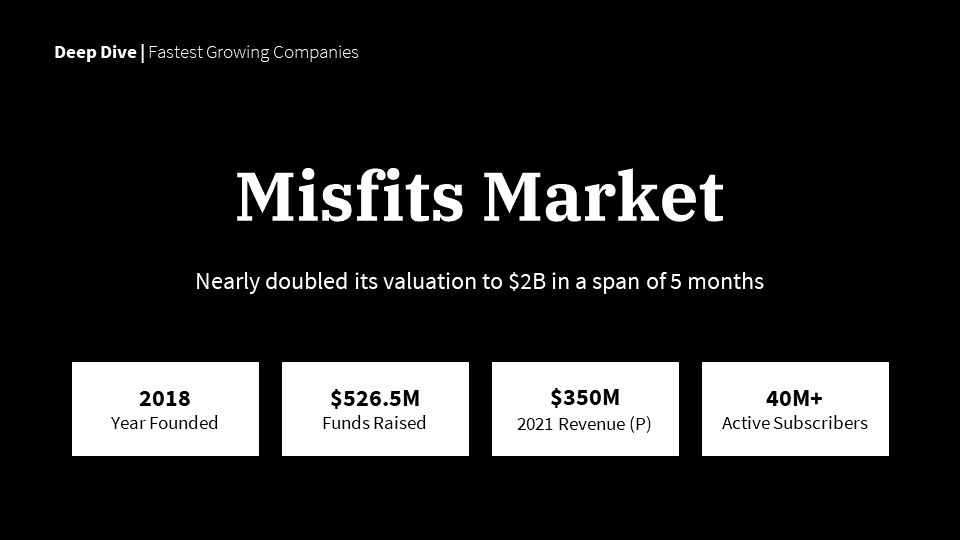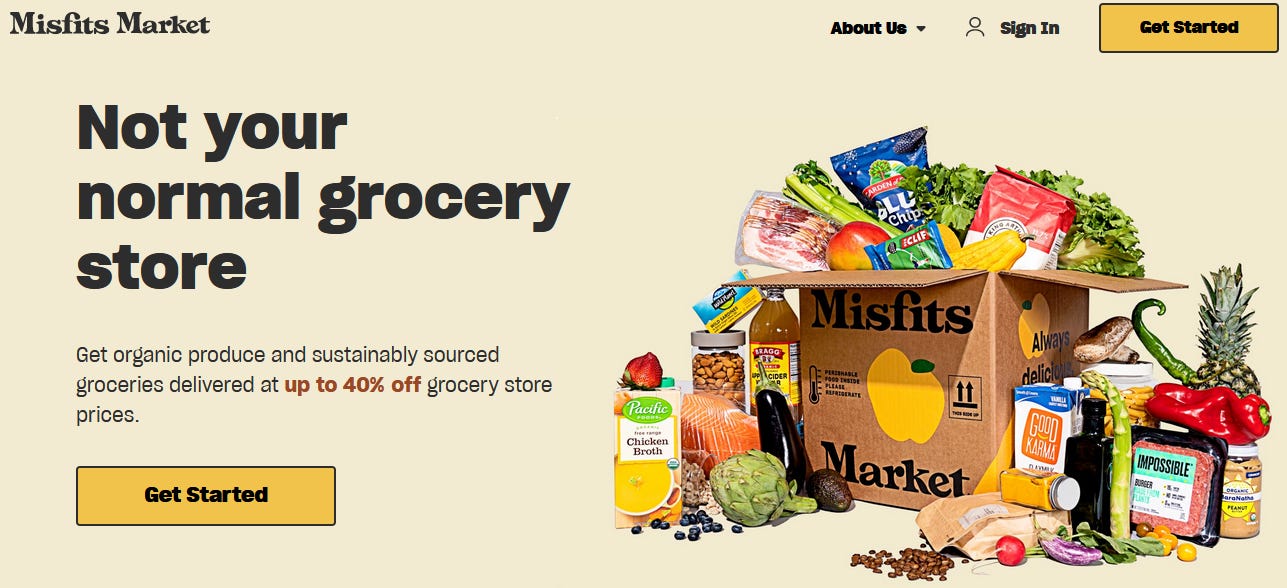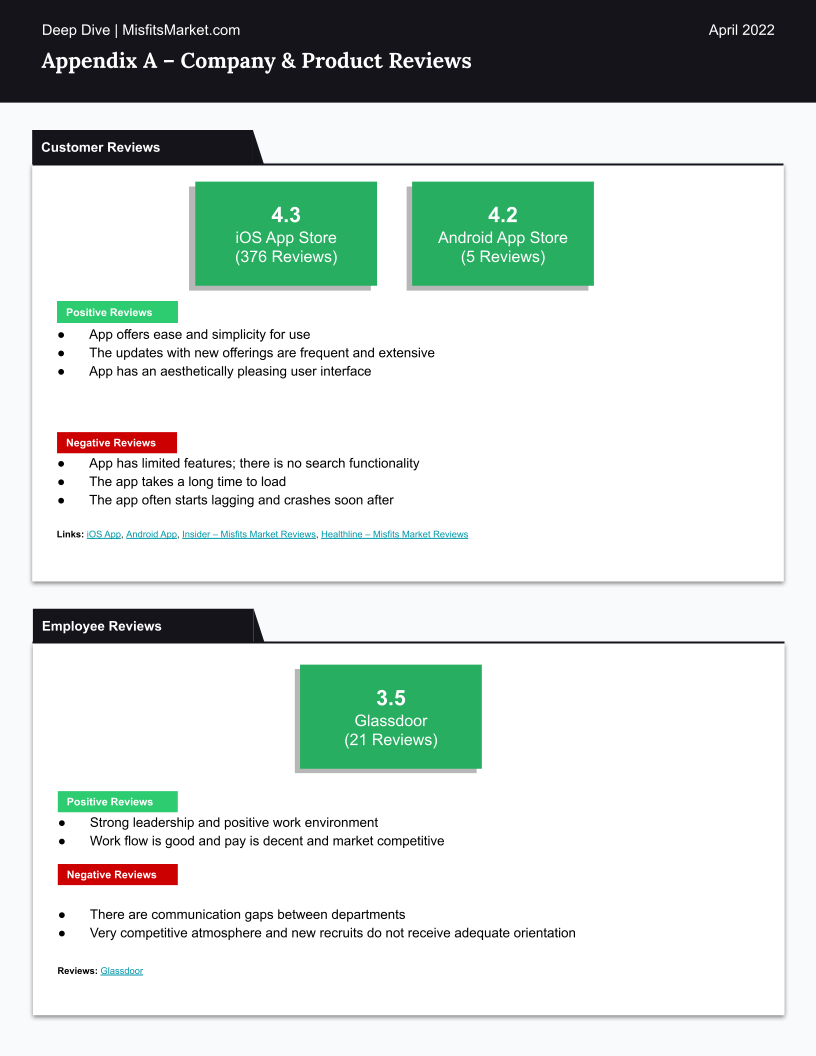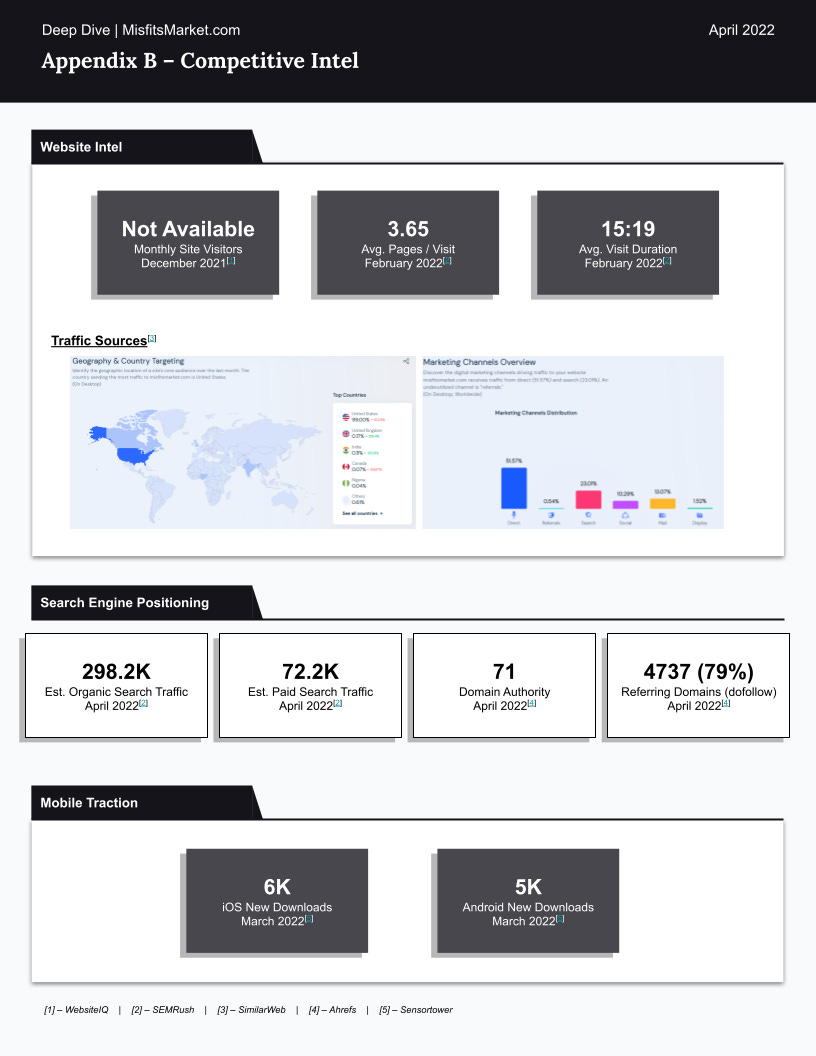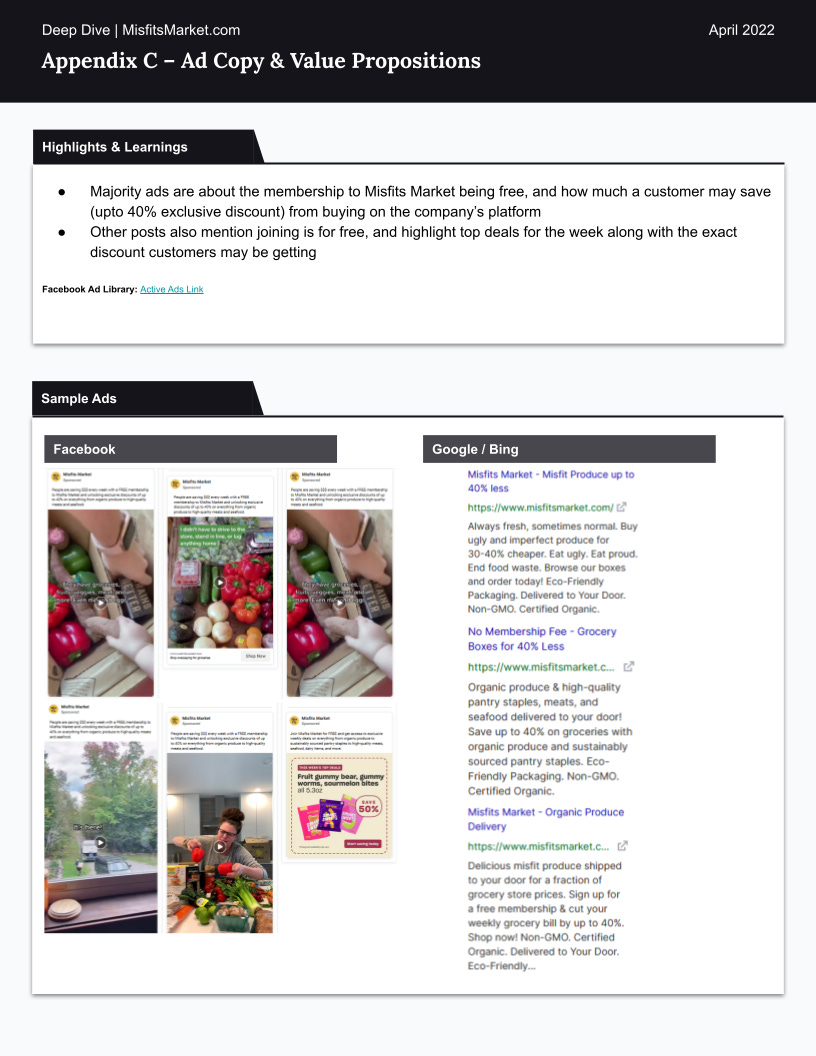CommerceTech - Teardown | Misfits Market
Teardown | Misfits MarketFounded in 2018, Misfits Market has raised over $500M to eradicate food wastage by selling fresh food that has been rejected by retail buyersBy Sarah Pariwush. These briefs are produced by leveraging publicly available data sources and information. If you notice a mistake or see an area for improvement, please let us know through this typeform. SnapshotFounded in 2018, Misfits Market is a D2C online grocer that buys leftover or surplus produce directly from farmers and sells it to consumers at a discounted cost. These are fruits and vegetables which normally cannot be sold in regular stores due to aesthetic issues. Aside from farm produce, the company also sources meats, seafood, and staple foods to sell at discounted prices, all of which are packaged and sold in the form of subscription boxes. Recently, the company has diversified into wine and dairy products. With headquarters in Pennsauken, New Jersey, Misfits has raised $526.5M in funding and was last valued at $2B after its latest funding round of $225M held in September 2021. About Misfits Market: Website, LinkedIn Business Overview and ProductsMisfits Market operates as an online grocer, buying unwanted produce from farmers, producers, and suppliers across the US and selling at reduced prices to willing consumers. Other than organic produce, the company sources categories such as meats, seafood, staples, and other groceries. The food is affordable and high quality and the company gets to make a positive impact on the food waste cycle. In November 2021, the company forayed into dairy products like cheeses and butter while in February 2022, the company expanded into the wine category produced from sustainable farming. Customers sign up for a subscription through which they receive grocery items weekly in a box according to their preferences. The company also brings in recyclable or compostable packaging for its products in its bid to be an eco-friendly company. Unlike CSAs (Community Supported Agriculture, a model where consumers can buy portions of any farm’s harvest in advance), Misfits Market directly buys produce from the source, combines it with other healthy grocery options, and directly delivers to subscribers’ doors. How It WorksMisfits Market cultivates relationships with farmers, producers, and suppliers to obtain millions of pounds of food that is typically expected to be wasted. The company gets direct access to fresh grocery items at the source, and due to its ability to cut out the middleman, can offer these items at reduced prices. The food options supplied by the company include pantry staples, fresh organic produce, as well as high-quality seafood and meat that may be available at more expensive rates from other grocers. The company gets its hands on any produce (fruits and vegetables) that doesn't meet the aesthetic criteria of a grocery store or is simply in surplus amounts. For staples, it works with food brands and buys off excess inventory from them, which is in surplus amounts or is short-dated (i.e., having “best-before” dates less than 6 weeks). Meat and seafood are also directly sourced from suppliers. In the case of wine, the company sources categories such as red, white, rosé, and sparkling. The focus is on sustainable farming methods, like less grape pruning and little use of water and pesticides. Hundreds of items are offered on the company’s platform at up to 40% off grocery store rates. Every week, refrigerated trucks from Misfit Markets reach farmers and collect the food. This is brought to the company warehouse, and a new assortment of grocery items is added to the platform weekly. On a weekly basis, each subscriber can choose what grocery items they want in their subscription boxes. In the process, farmers and producers can prevent waste at the source while the business improves access to underserved communities to food. Instead of focusing on urban markets where delivery services are common, the company caters to suburban and rural markets. It delivers food to almost all zip codes in the states that it serves. Business Model and PricingThe company makes revenue by charging a weekly subscription fee based on box sizes (small and large). For example, in November 2021 the price for two of its base boxes were $22 and $35. Any additional items that the customer wants to add have an additional cost. Wine comes in curated bundles of three and six bottles, at prices of $35.99+ and $92.99+ respectively. Every week, subscribers get a 3-day shopping window where they can log in to their account and build the order they want for the week. The minimum order size is $30. Once the shopping window ends, the customer is automatically charged for the order they have built if it exceeds $30. The order is then home-delivered in 2-3 days for a flat shipping fee of $6.99. According to the company’s claims, it offers price reductions of up to 40% off grocery store rates, and customers get to save an average of $21.49 each week. For example, meat and seafood are offered by the company at roughly 20%-40% lower prices than at traditional grocery stores. TractionSince its launch in 2018, the company has crossed the Billion threshold in annual revenues. From 2019 to 2020, it experienced 5x year-on-year growth in its active customer base and order volume. In 2020 alone, the company shipped about 77M pounds of food to 400,000+ homes across the US. By April 2021, it had already rescued the same amount of food it had rescued and shipped in 2020 and was serving 400,000 customers per month spanning over 37 states in the US. At this point in time, the company was offering almost 0.5M square feet of refrigerated space across the US. In May 2021, the expected sales for 2021 were released to be $350M. In September 2021, the company revealed its average order size had more than doubled to $52, since its launch. By the end of 2021, Misfits Market doubled its SKU count to 500 and aims to double it again in the next 6 months. It also expanded to California, delivering to nearly 40M residents across the nation and catering to 44 states in total. By November 2021, the company had saved a total of 225M pounds of food, 70% of which became additional revenue for farmers and producers who had no other avenues to make money from. Founder(s)Abhi Ramesh: Founder and CEO. Prior to Misfits Market, Abhi has co-founded Horizons School of Technology and StoreTok. He has also worked as an investment analyst at Apollo Global Management. History and EvolutionMisfits Market was built on the foundation of being an eco-friendly company that could help reduce the food waste cycle. According to the website, almost 1/3rd of whatever is grown in the US is rejected and never harvested because of not meeting superficial standards set by traditional grocery stores. For this reason, upon its launch in 2018, the company was hyper-focused on rejected produce which would be a ‘misfit’ for traditional grocers. Through the years, the company has now expanded its assortment to include regular grocery store items such as cooking supplies, staples, and different meats. Having started off by partnering with farmers, the company now partners with a variety of food makers that are looking for a solution to their surplus stock. Up until September 2020, Misfits Market followed a mystery box model where customers would receive an assortment of surprise foods. But upon noticing that many customers were simply discarding the surprise food items they didn't like, the company discontinued this model on the basis that it was still contributing to food wastage rather than solving it. It changed the model to one where customers could choose their own selection of food items from the company’s virtual food aisles. By April 2021, the company was already operating two warehouses where it stocked and packaged all the food it sourced, and was aiming to launch a 3rd warehouse. With its latest funding round in September 2021, the company doubled its valuation overnight from $1.1B to $2B and announced its plans to expand its distribution network to 5 more states, essentially covering the entire continental US. In November 2021, Misfits Market forayed into the dairy category, including 25 different kinds of cheeses and butter, with both organic and plant-based options. In upcoming months, the company would include milk, yogurt and eggs in the mix. In February 2022, Misfits Market expanded into the wine category, offering selections with an emphasis on sustainable farming methods. It also focuses on lesser known wine producing regions such as Sicily and South Africa. The company may later expand to other alcoholic beverages like beer and cider. Upcoming category expansion also includes frozen and prepared foods, and staples in the form of canned items. 3 key elements of the model used by Misfits Market typically resonate with customers: sustainability, convenience of ecommerce and availability of high quality products at low prices. With increasing awareness of the environment around the world, such models generally appeal to people looking to reduce their carbon footprint and waste. It also appeals for the reason that it combines lower price point of products with sustainable ecommerce. One other thing that stands out about the approach taken by Misfits Market is that it not only focuses on the well-being of end customers, but also makes things easier for food suppliers by providing them a very viable solution. Additional Learnings
Market Snapshot
Suggested Next Reads
Company Reviews & Competitive IntelIf you liked this post from The Commerce Tech Newsletter, why not share it? |
Older messages
Teardown | Zepto
Thursday, June 9, 2022
Founded in 2021, Zepto is an Indian instant grocery delivery service that raised $160M within 6 months of launch.
Teardown | Whatnot
Tuesday, June 7, 2022
Founded in 2019, Whatnot has raised over $220M to bring the livestreaming shopping phenomena from the East to the West
Teardown | Wholee – Direct-from-Manufacturer Marketplace
Tuesday, April 12, 2022
Founded in 2020, Wholee has received over 6m downloads globally for its app-based marketplace connecting consumers with manufacturers.
Teardown | Gorillas - Quick-Commerce Grocery Delivery
Sunday, April 10, 2022
Among the fastest growing German startups, Gorillas is aa quick-commerce grocery delivery service which has scaled to a $3.1B valuation in less than 2 years.
Teardown | CityMall
Tuesday, April 5, 2022
Founded in 2019, CityMall is a social eCommerce platform in India that has raised over $110 Million.
You Might Also Like
Building complete rank and rent sites in just minutes
Monday, March 3, 2025
This tool is incredible
🌁#90: Why AI’s Reasoning Tests Keep Failing Us
Monday, March 3, 2025
we discuss benchmark problems, such as benchmark saturation, and explore potential solutions. And as always, we offer a curated list of relevant news and important papers to keep you informed
I interviewed THE largest Amazon Seller [Roundup]
Monday, March 3, 2025
Need funding for your Canadian Amazon business? Not sure if you should use a Canadian corporation or US LLC to form your company? We'll cover these questions and more in our Start and Grow Your FBA
The state of data-driven decision-making for CPG brands
Monday, March 3, 2025
How marketers use purchase insights to maximize campaign performance
Facebook updates, TikTok ROI, Instagram format matches, and more
Monday, March 3, 2025
Today's Guide to the Marketing Jungle from Social Media Examiner... presented by social-media-marketing-world-logo New week, fresh insights, Reader! Stay sharp with the latest updates on AI, social
Are you losing revenue to rivals?
Monday, March 3, 2025
This is a challenge that costs businesses millions every year: Their customers are switching to competitors for various reasons... even though most of them could easily be fixed. On Tuesday, March 4,
DeepSeek’s 545% Profit Claim
Monday, March 3, 2025
PLUS: Siri 2027?!
Insurtech VC resets, readies for growth
Monday, March 3, 2025
Europe's share of regional IPOs sinks; the agtech revolution is now; hope flares for natural gas deals Read online | Don't want to receive these emails? Manage your subscription. Log in The
What I Think About The Crypto Strategic Reserve
Monday, March 3, 2025
Listen now (8 mins) | To investors, ͏ ͏ ͏ ͏ ͏ ͏ ͏ ͏ ͏ ͏ ͏ ͏ ͏ ͏ ͏ ͏ ͏ ͏ ͏ ͏ ͏ ͏ ͏ ͏ ͏ ͏ ͏ ͏ ͏ ͏ ͏ ͏ ͏ ͏ ͏ ͏ ͏ ͏ ͏ ͏ ͏ ͏ ͏ ͏ ͏ ͏ ͏ ͏ ͏ ͏ ͏ ͏ ͏ ͏ ͏ ͏ ͏ ͏ ͏ ͏ ͏ ͏ ͏ ͏ ͏ ͏ ͏ ͏ ͏ ͏ ͏ ͏ ͏ ͏ ͏ ͏ ͏ ͏ ͏ ͏ ͏ ͏ ͏
$92K BTC After Trump’s Crypto Call, MARBLEX Invests $20M—WOOF Ups the Game!
Monday, March 3, 2025
PlayToEarn Newsletter #262 - Your weekly web3 gaming news
